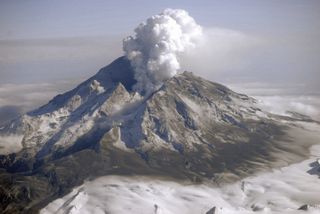Volcanoes

The U.S. Geological Survey defines a volcano as a vent in Earth's surface, either on land or on the seafloor, from which molten rock called magma, as well as ash and gases, can erupt or ooze. Different types of volcanoes erupt in different ways, with some erupting spectacularly and others, most notably Hawaii's shield volcanoes, steadily oozing lava. There are different types of volcanoes, including stratovolcanoes, shield volcanoes and cinder cones, and different types of lava and other volcanic flows. Volcanoes can be active, dormant or extinct. Most of Earth's volcanoes are located along the Pacific Ring of Fire, where many of Earth's tectonic plates subduct beneath another plate. Currently volcanic eruptions cannot be predicted, though most of the big, active volcanoes are routinely monitored and authorizes warn when they think an eruption is likely. Read below for the latest news on volcano monitoring and research, current volcanic eruptions and to see amazing pictures of volcanoes.
Latest about Volcanos

Iceland volcano LIVE: Risk of eruption appears to be decreasing
By Hannah Osborne, Sascha Pare, Harry Baker last updated
LIVE Latest updates on the imminent volcanic eruption in Iceland, which threatens local towns and the famous Blue Lagoon spa resort following a series of earthquakes and the appearance of sinkholes.

'It may take more time': Risk of eruption from Iceland volcano still high, with ground 'continuing to swell'
By Hannah Osborne published
Almost two weeks after the town of Grindavík was evacuated over fears of a volcanic eruption, the magma dike beneath Iceland still poses a high risk, with earthquakes and ground deformation ongoing.

Iceland volcano could burst like a 'fizzy drink,' with lava reaching Blue Lagoon resort in days
By Hannah Osborne published
Magma building beneath Iceland may break through the surface in a volcanic eruption, sending lava flows toward the Blue Lagoon, the Svartsengi geothermal power plant and the town of Grindavík.

What will happen if the Iceland volcano finally erupts?
By Harry Baker published
Explainer Experts have warned that an underground magma tunnel between a pair of Icelandic towns could erupt at any moment. But what will this eruption look like? And how far-reaching will its effects be?

Why is Iceland so volcanically active? A geologist explains
By Jaime Toro published
Iceland's volcanic activity is generally tame compared with explosive eruptions along the Pacific's Ring of Fire. This time, it's shaking up a town.

Supervolcano 'megabeds' discovered at bottom of sea point to catastrophic events in Europe every 10,000 to 15,000 years
By Hannah Osborne published
Four huge deposits from supervolcano eruptions over the last 40,000 years have been discovered at the bottom of the Mediterranean Sea.

'Time's finally up': Impending Iceland eruption is part of centuries-long volcanic pulse
By Hannah Osborne published
Iceland's Reykjanes Peninsula is now in a new era of volcanic eruptions that will last for up to 500 years, and the building magma beneath Sundhnúkur and Grindavík is part of this millenia-long cycle.

Russia's tallest volcano spews out 1,000-mile-long river of smoke after giant eruption, satellite images reveal
By Harry Baker published
Russia's Klyuchevskoy volcano, which is the tallest volcano in Europe and Asia, violently erupted on Nov. 1 and left behind a trail of smoke and ash that was photographed by NASA satellites.
Live Science newsletter
Stay up to date on the latest science news by signing up for our Essentials newsletter.
